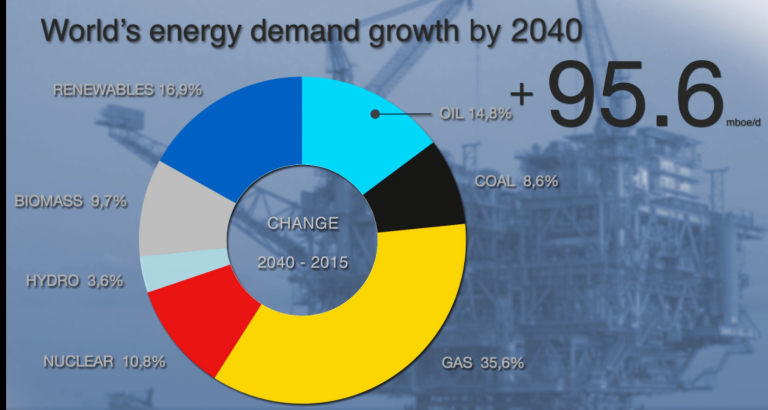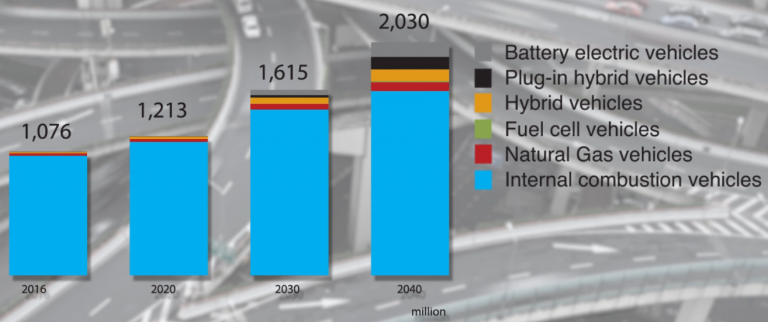While global warming alarmists continue to fantasize crude oil use getting drastically reduced already starting next year, OPEC sees it totally differently. German online. center-left weekly Die Zeit reports “OPEC anticipates growing oil demand until 2040.”
This poses a huge dilemma for the activists and alarmists who are urgently pressing to transform society –based on the fear and belief that the globe will warm rapidly if we don’t act now.
The other fear is that rising oil consumption over the next 25 more years accompanied stalling global temperatures will forever expose climate science as a ruse.
Still decades away from peak oil consumption
Die Zeit writes that OPEC is sure that the planet is still years away from peak oil demand, and the reason is because cars will continue to be mostly powered by petroleum even beyond 2040. Obviously a number of leading energy experts believe electric cars will remain a pipe dream for quite some time.
Chart: OPEC
Oil consumption will climb almost 20%
Firstly OPEC sees the world population growing from 7.6 billion today to 9.2 billion by 2040 and global GDP growing by a whopping 126%. That’s all going to require lots of reliable and efficient energy. The good news is that overall energy efficiency will increase, as only 96% more energy will be needed to power the 126% GDP boost.
Most of the energy increase will come from India and China. Moreover, the global average standard of living will also grow strongly as the per capita energy use will be much higher. OPEC projects that much of the added energy demand will be supplied by natural gas (see chart above). Part of the increased demand will be met by coal and oil.
OPEC also foresees continued domination by the internal combustion engine for passenger cars, even in 2040:
Chart: OPEC
Electric mobility still decades away
OPEC also projects there will be more than 2 billion automobiles on the world’s roads by 2040, almost double today’s number. Over 80% of these will continue to be powered by internal combustion engines. The electric vehicle age appears to be something for the late 21st century. Visions of a near zero carbon society within the next 30 years are more fantasy than reality.
Not surprisingly, most of the increased energy demand will come from Asia and Africa. The richer, developed OECD countries will see little growth in energy demand.
The OPEC video summarizes by saying that it is “committed to reducing energy poverty“. That target of course would make a huge contribution to alleviating the overall misery that still plagues many poor countries. Oil, coal and gas will continue to play the leading role.
Of course, jet-setting climate activists and alarmists would like to deny poor countries access to affordable and reliable energy.
Good luck with that.







Of course OPEC projects something like this, but aren’t you guys skeptics here? How is that projection compatible with automakers claiming electric vehicles will have lower TCOs than gasoline cars in the late 2020s for normal usage? Something that’s currently only true for daily long distance (100+ km one way) commuters.
Claim: “electric vehicles will have lower TCOs than gasoline cars in the late 2020s”
They may say this and even believe it, but I’ve never checked the TCOs of any auto we’ve purchased. Most people do not. See the list at this link: Expensive Watches
People do not buy a ¾ Million dollar watch to tell time.
More seriously, until 30 years after EVs are selling half the vehicles, and then 51%, following year 55%, and so on – there will be no noticeable effects on fossil fuel demand. The average age of autos on U. S. highways is >11.5 years; autos are selling at a rate of about 17 million each year; there are nearly 300 million now. More are being bought than are being scrapped. (This doesn’t include other countries.)
Someday these numbers may bend in favor of EVs – and still some of them will use electricity powered by carbon based fuel.
Those under the age of 50 may see these changes.
I don’t expect to.
Sooner or later the greenies are going to have a very unpleasant collision with reality.
I, for one, look forwards to that.
Particularly if it leaves Sebastian with a sore head!
Then better read the BP report. Reality is that green energy is fastly approaching the point where new installations produce enough or more useable energy to cover the increase in energy usage.
Why exactly do you want reality to be more and more fossil fuels being burnt indefinitely?
The higher the demand for energy becomes, the greater the shortfalls will be when wind and sun don’t show up.
Even if that really is “reality” that new installations of wind turbines and solar panels are approaching the capability of covering the additional surge of year-to-year energy demand worldwide, this will not even begin to reduce emissions because wind and solar will need to supplant the existing baseline demand supplied by fossil fuels. And that’s not happening either. In fact, while wind and solar have grown, so have fossil fuels — to an even greater degree. Supplanting has not occurred, as the below graph shows.
https://fractionalflow.files.wordpress.com/2014/10/fig-3-world-growth-in-fossil-fuels-versus-solar-and-wind-1990-to-2013.png
Sebastian just in case you haven’t twigged it yet.
Wind and solar are unreliable and the developers pull out at the first sign of subsidy cuts.
They are a scam.
And yes burn baby burn, dig baby dig and drill baby drill!
PS I have 3 kids who I want to have a future. One that I do not see as safe in the hands of green lunatic Malthusian.
Because fossil fuels, and more specifically reliable, cheap energies, lift poor people out of poverty and squalor. 800 million Chinese people were lifted out of poverty in China between the 1970s and now. India is now doing the same thing. Lifting people out of poverty is good. Wind and solar cannot do what fossil fuels can. They’re unreliable.
Great, as you repeat you unreliability mantra, i’ll reply with the sustainability mantra. Fossil fuels are not a sustainable way to power a civilization. Why not accelerate the transition to sustainable energy? Sustainable energy lifts out of poverty AND doesn’t inccur large external costs on a society. Being cheap and reliable is an illusion, Kenneth. It’s neither cheap, nor can we rely on the availability of endless resources outside of our territories.
Well, when the time comes that we run out of petroleum-based energies, which is likely not to happen for hundreds of years (as even Bill Nye agrees), then hopefully by that time we will have alternative means of producing and consuming reliable energy. Wind and solar are intermittent, unreliable, and hence they need backup from that which is reliable, which includes nuclear energy and…fossil fuels. So they’re not the future. There will likely be a day, 20-30 years from now, when dormant wind farms will pollute the landscape, waiting for taxpayer financing to fund their dismantling.
It would not appear that the world agrees that we are charting an unsustainable path, considering the explosion of fossil fuel use since 1990 relative to wind and solar.
seb,
“Great, as you repeat you unreliability mantra, i’ll reply with the sustainability mantra.”
Current green technology is NOT ‘sustainable’! It is very unlikely to be ‘sustainable’ in the near future.
Show me where a solar panels and windfarms can be manufactured using only ‘sustainable’ energy sources.
Show me how the structure, infrastructure, and installation can be done using just ‘sustainable’ energy.
Show me how and where all this is maintained using just ‘sustainable’ energy.
IT CAN NOT BE DONE!
It is a pipe-dream, a myth.
It is utter and complete nonsense!
My guess is that any green climate funds that do get transferred to developing nations will fund the development of fossil-fueled power and transportation.
“… any green climate funds …”
… will disappear into the ether — like the many hundreds of millions of funds previously handled by the UN.
The Obama administration transferred $500 million to the UN fund** just before being booted out of Wash. D.C.
Where is that money today?
**I believe this is the same as the Green Climate Fund.
Funds of GCF